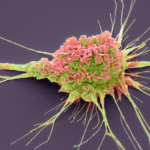Exosome-based therapies are emerging as a groundbreaking approach in personalized medicine, offering targeted and highly effective treatment options for a variety of conditions. Exosomes, which are nanosized extracellular vesicles secreted by cells, play a crucial role in intercellular communication and have garnered significant attention for their potential in drug delivery and regenerative medicine. These therapies harness the natural properties of exosomes to deliver biomolecules like proteins, RNA, and lipids directly to specific target cells, enabling more precise treatment. Below, we explore five promising exosome-based therapies that are transforming the treatment landscape, including their applications in dermatology and neurology.
1. Exosome-based Treatments for Atopic Dermatitis
Exosome-based therapies are showing great promise in the treatment of atopic dermatitis (AD), a chronic inflammatory skin condition. Traditional treatments for AD, such as corticosteroids and immunosuppressants, often come with significant side effects, especially with long-term use. Exosomes derived from mesenchymal stem cells (MSCs) have been found to have anti-inflammatory properties, promoting skin regeneration and modulating immune responses. These exosome-based treatments for atopic dermatitis are designed to directly target the skin’s immune cells, reducing inflammation and promoting healing without the harsh side effects of conventional therapies.
Recent studies have demonstrated that exosomes can deliver bioactive molecules that help repair damaged skin cells and reduce the inflammatory response in AD. By promoting a more balanced immune response, exosome-based treatments offer the potential for a more effective and safer long-term solution for patients with chronic eczema and other dermatological disorders. This approach represents a shift toward more personalized, patient-specific treatment regimens that can address the underlying causes of skin inflammation in AD.
2. Exosome-based Therapies for Cancer Treatment
Exosome-based therapies are being explored as a novel approach in cancer treatment, particularly in the delivery of therapeutic agents like chemotherapy drugs, RNA-based therapies, and immune modulators directly to tumor sites. One of the main advantages of using exosomes for cancer therapy is their ability to navigate the body’s complex systems, crossing biological barriers like the blood-brain barrier and targeting specific cells without affecting surrounding healthy tissue. Exosome-based therapies can be engineered to load specific cargo, enhancing their therapeutic efficacy and minimizing side effects associated with traditional cancer treatments.
Researchers are focusing on using exosomes to facilitate targeted delivery of anticancer drugs and to modulate immune responses to improve the body’s natural ability to fight cancer cells. This approach is expected to significantly reduce toxicity, increase drug effectiveness, and offer more precise treatment options for patients with various types of cancer.
3. Exosome-based Treatments for Neurodegenerative Conditions
Exosome-based therapies hold significant promise for the treatment of neurodegenerative conditions such as Alzheimer’s disease, Parkinson’s disease, and amyotrophic lateral sclerosis (ALS). These conditions are characterized by progressive neuronal damage and the loss of critical brain functions. Exosomes offer a unique advantage in the treatment of neurodegenerative diseases due to their ability to cross the blood-brain barrier (BBB) and deliver therapeutic molecules directly to the brain.
Studies have shown that exosomes derived from stem cells or other specialized cells can carry neuroprotective factors, growth factors, and RNA that may help repair damaged neurons, reduce inflammation, and even regenerate lost brain cells. For example, exosome-based therapies for the treatment of neurodegenerative conditions are being developed to slow disease progression, alleviate symptoms, and improve quality of life for patients suffering from these debilitating disorders. Personalized exosome-based treatments can be tailored to each patient’s specific needs, opening new doors for effective and non-invasive therapies in neurology.
4. Exosome-based Regenerative Medicine
Exosome-based therapies are also revolutionizing regenerative medicine, with applications in tissue repair and healing. Exosomes are being explored as a delivery system for growth factors, cytokines, and genetic material that can stimulate tissue regeneration and repair. These therapies can be used to treat a variety of conditions, including wounds, fractures, and even heart damage following a heart attack.
By promoting the healing of damaged tissues and reducing inflammation, exosomes offer a natural and less invasive alternative to traditional regenerative treatments. Exosome-based therapies could accelerate the body’s own healing processes, improve recovery outcomes, and potentially reduce the need for surgeries or other invasive procedures.
5. Exosome-based Therapies for Autoimmune Diseases
Exosome-based therapies are also being researched for the treatment of autoimmune diseases, where the body’s immune system mistakenly attacks its own tissues. Exosomes derived from immune-modulating cells, such as MSCs, are being studied for their potential to balance immune responses, reduce inflammation, and restore normal immune function. These therapies could offer a more targeted and personalized approach to treating autoimmune diseases like rheumatoid arthritis, lupus, and multiple sclerosis, compared to traditional immunosuppressive treatments.
Exosome-based therapies have the potential to specifically target immune cells that are causing damage while preserving healthy immune responses, reducing the overall risk of side effects, and improving patient outcomes. As the research progresses, these treatments could provide more effective, long-term management options for autoimmune diseases.
Conclusion
Exosome-based therapies are rapidly becoming a key player in the field of personalized medicine, offering more targeted, effective, and safer treatment options across a variety of medical conditions. From treating chronic inflammatory diseases like atopic dermatitis to advancing the treatment of neurodegenerative conditions, exosome-based treatments are paving the way for precision medicine. As ongoing research continues to unlock the potential of exosomes, we can expect to see even greater breakthroughs, transforming how we approach disease treatment and patient care across the medical landscape.

